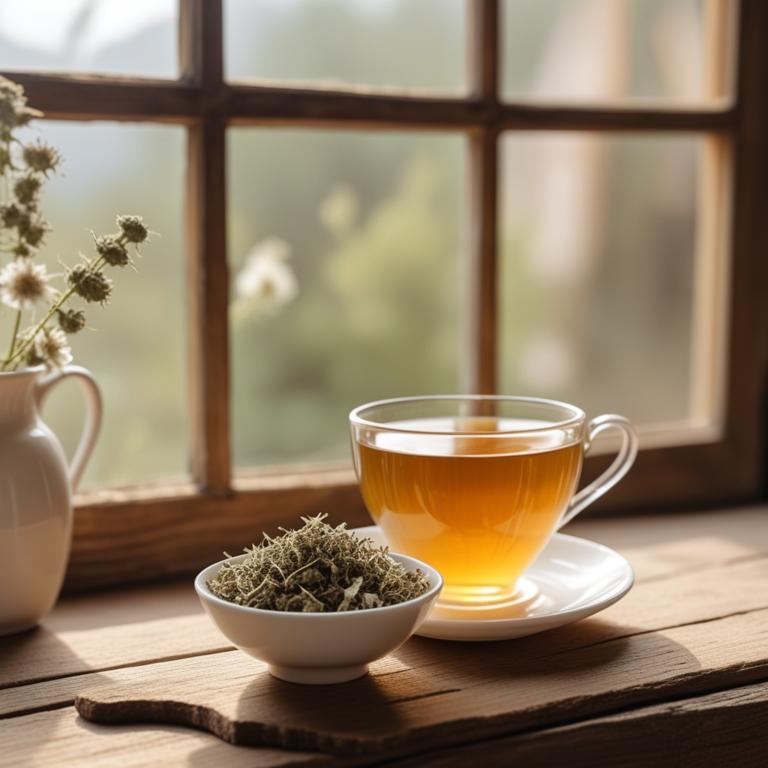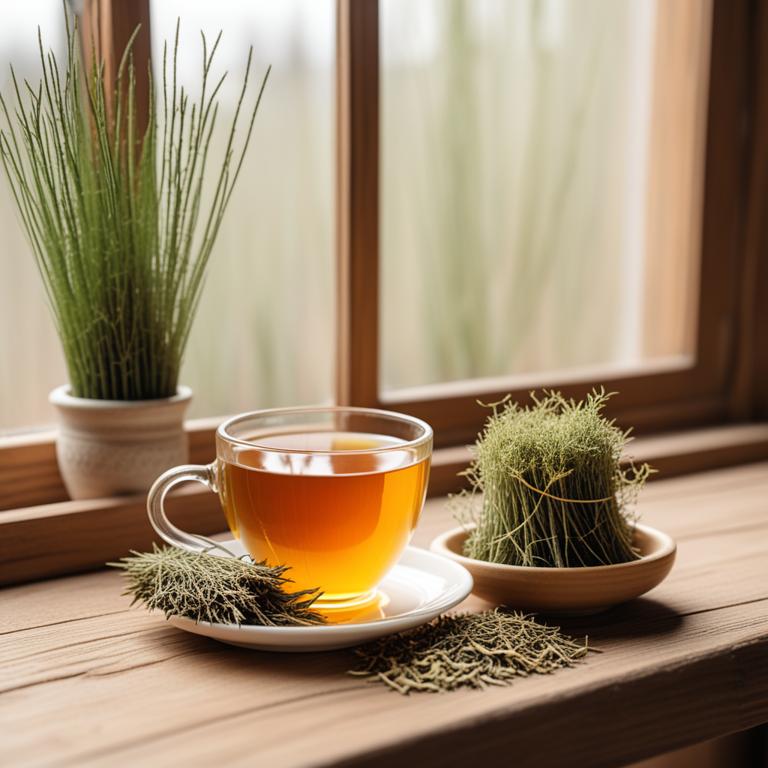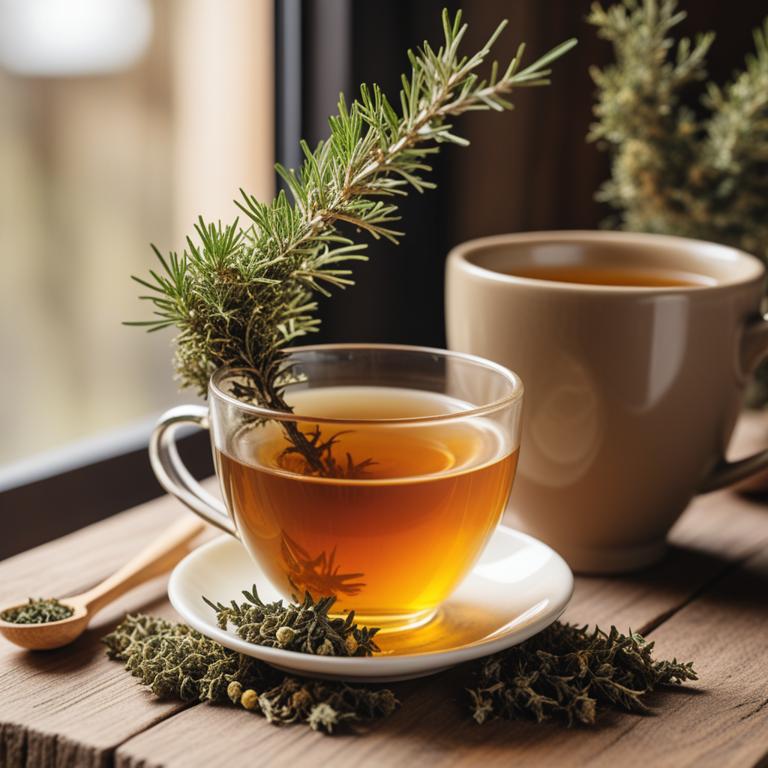8 Herbal Teas For Cystitis

Herbal teas can be a great help when you're dealing with cystitis.
Cystitis is a painful condition that affects the bladder, and it can be caused by a bacterial infection or irritation from certain foods. Herbal teas can relieve cystitis symptoms because they have anti-inflammatory properties that can help soothe the bladder and reduce pain. For example, Achillea millefolium, also known as yarrow, has anti-inflammatory compounds that can help ease pain and reduce inflammation in the bladder. Equisetum arvense, or horsetail, is another herb that's been used for centuries to treat urinary tract problems.
Its silica content can help strengthen the bladder and reduce inflammation. Cinchona officinalis, or Peruvian bark, contains quinine, which can help reduce pain and inflammation. Drinking herbal teas for cystitis can bring several benefits to your life. Firstly, it can provide quick relief from painful symptoms, allowing you to go about your daily activities without discomfort. Secondly, herbal teas are a natural and gentle way to treat cystitis, which means you can avoid harsh medications and their potential side effects.
Lastly, many herbal teas have additional health benefits, such as antioxidant properties, which can help protect your body from other health problems.
- 1. Achillea millefolium
- 2. Equisetum arvense
- 3. Cinchona officinalis
- 4. Sambucus nigra
- 5. Juniperus communis
- 6. Taraxacum officinale
- 7. Glycyrrhiza glabra
- 8. Althaea officinalis
1. Achillea millefolium

Achillea millefolium teas contains compounds like sesquiterpene lactones, flavonoids, and phenolic acids.
These constituents have anti-inflammatory and antimicrobial properties, which help reduce swelling and fight off infections in the urinary tract. The flavonoids in this tea, such as kaempferol and quercetin, have antioxidant properties that can protect the bladder and urinary tract from damage. The antimicrobial properties of sesquiterpene lactones, like achillin, can help eliminate the bacteria responsible for cystitis.
By reducing inflammation and fighting off infections, Achillea millefolium teas may help alleviate symptoms of cystitis, such as burning and pain during urination.
- Gather 1 cup of fresh Achillea millefolium leaves and flowers, or 2 teaspoons of dried leaves and flowers.
- Combine the gathered leaves and flowers with 1 cup of boiling water in a large cup or teapot.
- Steep for 5-7 minutes, then strain the liquid using a fine-mesh sieve or cheesecloth.
- Discard the solids and let the tea cool. You can store it in the fridge for up to 24 hours.
- Drink 1/2 to 1 cup of the tea, 2-3 times a day, to help alleviate cystitis symptoms.
2. Equisetum arvense

Equisetum arvense teas contains bioactive constituents like ferulic acid, flavonoids, and lignans.
These compounds have anti-inflammatory and antioxidant properties that help soothe and protect the urinary tract. The lignans in Equisetum arvense tea have been shown to have antimicrobial effects, which can help combat bacterial infections that cause cystitis. The anti-inflammatory properties of ferulic acid and flavonoids can reduce inflammation and irritation in the bladder, making it a potentially helpful remedy for cystitis.
By reducing inflammation and fighting off bacterial infections, Equisetum arvense tea may help alleviate symptoms of cystitis.
- Gather 2 tablespoons of dried Equisetum arvense root and leaves, and a cup of boiling water.
- Steep the Equisetum arvense in the boiling water for 5-7 minutes.
- Strain the tea into a cup using a fine-mesh sieve or cheesecloth.
- Add honey to taste, if needed, and mix well.
- Drink the tea 2-3 times a day for cystitis relief, as directed by a healthcare professional.
3. Cinchona officinalis

Cinchona officinalis teas contains several bioactive constituents, including quinidine and quinine, which have anti-inflammatory properties that help reduce the pain and discomfort associated with cystitis.
The alkaloids in Cinchona officinalis also have antimicrobial properties, which can help prevent bacterial infections that contribute to cystitis. Quinidine helps relax the smooth muscle in the bladder, reducing spasms and cramping that often occur with cystitis. The antiseptic properties of Cinchona officinalis can also help reduce inflammation in the urinary tract, promoting healing and preventing further irritation.
By reducing inflammation and preventing bacterial infections, Cinchona officinalis teas can provide relief from the symptoms of cystitis.
- Gather 20 grams of dried Cinchona officinalis bark, 1 cup of boiling water, and a tea infuser.
- Add 2 tablespoons of dried Cinchona officinalis bark to the tea infuser.
- Pour 1 cup of boiling water over the bark in the tea infuser.
- Steep for 5-7 minutes, then remove the tea infuser.
- Strain the tea into a cup and drink 2-3 times a day for cystitis relief.
4. Sambucus nigra

Sambucus nigra teas contains flavonoids and phenolic acids that make it effective in treating cystitis.
The flavonoids, particularly quercetin and kaempferol, have anti-inflammatory properties that help reduce swelling and inflammation in the urinary tract. The phenolic acids, such as caffeic acid, have antimicrobial properties that help combat bacterial infections that cause cystitis. Sambucus nigra teas also contains antioxidants that help protect the bladder and urinary tract from oxidative damage.
By reducing inflammation and infection, Sambucus nigra teas helps alleviate symptoms of cystitis such as burning during urination and frequent urination.
- Gather 2 tablespoons of dried Sambucus nigra flowers and 1 cup of boiling water.
- Pour the boiling water over the Sambucus nigra flowers in a cup.
- Let the mixture steep for 5-7 minutes to allow the flavors to combine.
- Strain the tea into another cup to remove the flowers.
- Drink the tea 2-3 times a day to help alleviate cystitis symptoms.
5. Juniperus communis

Juniperus communis teas contains compounds like borneol, terpinen-4-ol and limonene, which have anti-inflammatory properties that can help reduce swelling and irritation in the urinary tract.
The tea also contains flavonoids and lignans, which have antioxidant properties that can help protect the body from damage caused by free radicals. The flavonoids in Juniperus communis tea, particularly kaempferol and quercetin, have been shown to have anti-inflammatory and antimicrobial effects, which can help combat bacterial infections that can cause cystitis. The antioxidants and anti-inflammatory compounds in the tea may help reduce pain and discomfort associated with cystitis.
The properties of Juniperus communis tea make it a potential natural remedy for alleviating symptoms of cystitis.
- Gather 1 tablespoon of dried Juniperus communis berries and 1 cup of boiling water.
- Steep the Juniperus communis berries in the boiling water for 5-7 minutes.
- Strain the mixture and discard the berries.
- Drink 1/2 cup of the tea 2-3 times a day to help manage cystitis symptoms.
- Consult a healthcare professional before using Juniperus communis tea as a treatment for cystitis.
6. Taraxacum officinale

Taraxacum officinale teas contains flavonoids and phenolic acids, which have anti-inflammatory properties.
These compounds help reduce swelling and irritation in the urinary tract. The tea also contains saponins, which have antimicrobial properties that can help combat bacterial infections that can cause cystitis. The diuretic properties of Taraxacum officinale teas can increase urine production, helping to flush out bacteria and reduce the risk of infection.
The antioxidants in the tea can also help reduce oxidative stress, which can contribute to the development of cystitis symptoms.
- Get 1 cup of fresh Taraxacum officinale leaves and flowers.
- Measure 2 tablespoons of the leaves and flowers, and place them in a cup.
- Pour 1 cup of boiling water over the leaves and flowers.
- Steep for 5-7 minutes, then strain the liquid.
- Drink 1 cup of the tea, 2-3 times a day, to help soothe cystitis symptoms.
7. Glycyrrhiza glabra

Glycyrrhiza glabra teas contains saponins, glycyrrhizin and flavonoids, which make it a good choice for cystitis.
Saponins have anti-inflammatory properties that help reduce swelling and irritation in the urinary tract. Glycyrrhizin has anti-microbial properties that help fight off infections that can cause cystitis. Flavonoids, such as quercetin, have anti-inflammatory and antioxidant properties that help soothe and protect the bladder lining.
Drinking Glycyrrhiza glabra teas may help alleviate symptoms of cystitis by reducing inflammation and infection, and promoting healing in the urinary tract.
- Gather 1 tablespoon of dried Glycyrrhiza glabra root, a cup of boiling water, and a tea infuser or strainer.
- Place the dried root in the tea infuser or strainer.
- Pour the boiling water over the root, and let it steep for 5-7 minutes.
- Strain the tea into a cup, and discard the root.
- Drink the tea 2-3 times a day to help alleviate cystitis symptoms.
8. Althaea officinalis

Althaea officinalis teas contains mucilages, particularly althea nucilage and althea mucilage, which are complex mixtures of polysaccharides.
These mucilages help to soothe and calm irritated bladder tissues, reducing inflammation and discomfort associated with cystitis. The anti-inflammatory properties of Althaea officinalis are attributed to its high content of flavonoids, such as quercetin and kaempferol. These flavonoids help to reduce inflammation and alleviate symptoms of cystitis, including pain and burning sensations during urination.
By reducing inflammation and soothing irritated tissues, Althaea officinalis teas can provide relief from cystitis symptoms and promote healing in the bladder.
- Gather 1 cup of fresh or dried Althaea officinalis root.
- Measure 1 tablespoon of the root for every 1 cup of water.
- Heat 1 cup of water in a pot.
- Add the measured Althaea officinalis root to the hot water.
- Let it steep for 5-10 minutes before straining and drinking.